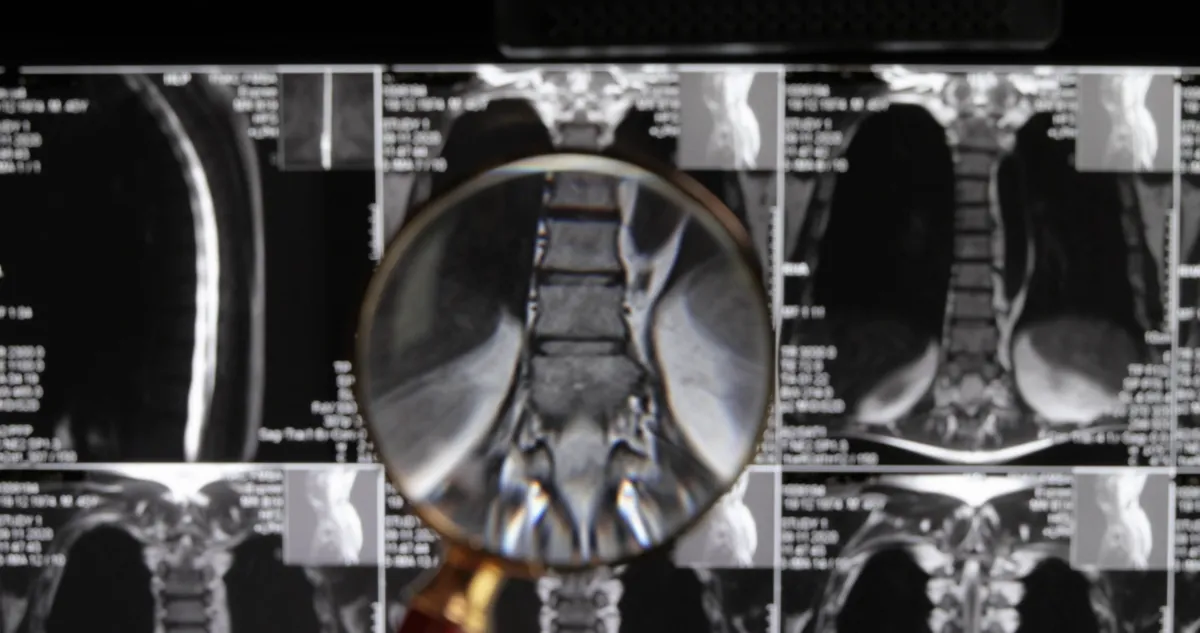Herniated Disc Injury Lawyers in Cumming, GA
Herniated disc injuries can be debilitating and may qualify for workers' compensation benefits in Georgia. Learn about the process and how we can help.

Biomechanics of a Herniated Disc Injury
The spine is made up of a series of bones called vertebrae, which are separated by soft, flexible discs. These discs act as shock absorbers and help maintain the spine’s flexibility. A herniated disc, also known as a slipped or ruptured disc, occurs when the soft inner material of the disc pushes through the tough outer layer. This can happen due to wear and tear or a sudden, forceful movement, such as lifting a heavy object or twisting the spine.
Herniated discs can cause severe pain, numbness, and weakness in the affected area due to the disc material pressing on nearby nerves. In some cases, the herniated disc can lead to long-term complications and reduced mobility.
Challenges in Proving a Herniated Disc Injury
Proving the cause and extent of a herniated disc injury can be challenging, particularly if there is a pre-existing condition. Pre-existing conditions, such as degenerative disc disease, can complicate the process of determining whether the herniated disc was caused by a work-related incident or a pre-existing issue. Furthermore, the symptoms of a herniated disc can vary significantly between individuals, making it difficult to establish a clear connection between the injury and the impact on your ability to work. Pinecone Assistant
Employer Takes the Employee as They Are
Under Georgia law, the aggravation of a preexisting condition is considered a compensable injury under the Workers’ Compensation Act. This means that if an employee’s work duties or a work-related accident aggravates a preexisting back condition, the resulting aggravation is treated as a new injury and is eligible for workers’ compensation benefits.
Employers are required to take employees as they find them, meaning that an employee does not need to be in perfect health or free from preexisting conditions to qualify for workers’ compensation. If work activities aggravate a preexisting condition, the resulting injury is compensable, regardless of the original cause of the condition
The Workers’ Compensation Act explicitly includes the aggravation of a preexisting condition as a compensable injury, provided the aggravation arises out of and in the course of employment. This compensability continues as long as the aggravation remains the cause of the disability or the need for medical treatment. Once the aggravation ceases to be disabling, it is no longer compensable
Treatments for Herniated Discs
Conservative Treatments:
- Physical Therapy: This is frequently prescribed to help alleviate symptoms and improve mobility. For example, Dr. Koch prescribed physical therapy for an employee with lumbar disc herniations, and the employee underwent multiple sessions.
- Medications: Pain medications, including nonsteroidal anti-inflammatory drugs (NSAIDs), muscle relaxers, and sometimes narcotics, are commonly used.
- Epidural Steroid Injections: These are often used to reduce inflammation and pain.
- Home Exercise Programs: These are sometimes suggested to strengthen the back and improve flexibility, as noted in Dr. Karsch’s recommendations.
- Pain Management Techniques: These include the use of TENS units, trigger point injections, and other modalities.
Surgical treatments are often a last resort when conservative treatments fail to provide relief. Surgical options include:
- Discectomy: This procedure involves removing the herniated portion of the disc to relieve nerve pressure.
- Spinal Fusion: In cases of severe instability or recurrent herniations, spinal fusion may be recommended.
- Artificial Disc Replacement: This is a less common surgical option, but can be better than a spinal fusion for some patients.
- Laminectomy: This involves removing part of the vertebra to relieve pressure on the spinal cord or nerves.
Other Interventions:
- Radiofrequency Ablations: These are used to target specific nerves to reduce pain.
- Spinal Cord Stimulators: These devices are sometimes used for chronic pain management when other treatments fail.
The choice of treatment depends on the severity of the herniation, the patient’s symptoms, and their response to conservative measures.
Can you get a settlement for a disc herniation?
Yes, you can receive a settlement for a herniated disc injury in Georgia. The amount of the settlement will depend on various factors, including the severity of the injury, the impact on your ability to work, and the extent of medical treatment required. In some cases, settlements can be substantial, especially if the herniated disc has resulted in long-term disability or chronic pain.
How a Workers’ Compensation Lawyer Can Help
A workers’ compensation lawyer can help you overcome the challenges in proving your herniated disc injury by gathering evidence, working with medical professionals, and presenting a strong case. They can help establish the cause of the injury, demonstrate the impact on your ability to work, and navigate the complexities of workers’ compensation laws. Additionally, a skilled lawyer can effectively handle communication with insurance companies and employers, ensuring that your rights are protected throughout the process.
If your claim is denied, a workers’ compensation lawyer can guide you through the appeals process, gather additional evidence, and represent you in any necessary hearings or court appearances. By hiring a workers’ compensation lawyer, you can focus on your recovery while your attorney works to ensure you receive the compensation you deserve.
